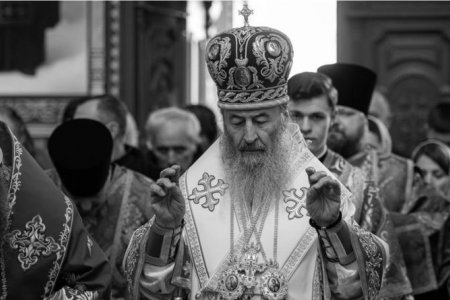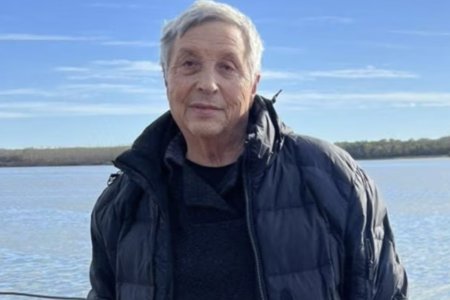
Ukraine’s President Volodymyr Zelenskyy has stripped Metropolitan Onufriy of his Ukrainian citizenship on the grounds, as asserted by Ukraine’s Security Service [SBU] that the Head of the Ukrainian Orthodox Church voluntarily took on Russian citizenship back in 2002, and continues to maintain links with the Moscow Patriarchate. The Ukrainian Orthodox Church [UOC], which was, at least until Russia’s full-scale invasion of Ukraine, affiliated to the Moscow Patriarchate, reacted to the presidential decree on 2 July 2025 by denying that the Metropolitan has any other passport, other than Ukrainian.
UOC has also asserted that it severed any links with Moscow following Russia’s full-scale invasion of Ukraine, with the Church no longer having ‘MP’ [for Moscow Patriarchate] in their name. This was disputed by, among others, Viktor Yelensky, Head of Ukraine’s State Service on Ethnic Policy and Freedom of Conscience, who insisted, prior to the adoption of a law banning churches linked with Moscow, that UOC remains a structural division of the Russian Orthodox Church.
The UOC spokesperson stated that further response would be “solely within the framework of Ukrainian legislation”. It remains to be seen whether the Metropolitan will lodge an appeal with Ukraine’s Supreme Court against the decree, with this meaning that proof would need to be demonstrated of the presence or lack of Russian citizenship and of current links with the Russian Orthodox Church.
With respect to Russian citizenship, there are two entirely different stories which cannot both be true. According to the SBU, Onufriy voluntarily applied for, and received, Russian citizenship in 2002 and is continuing to use this.
The UOC spokesperson on 2 July denied that Onufriy had ever applied for another country’s citizenship. This, presumably, hearkens back to the account given by Onufriy himself in April 2023, following a media investigation which reported that the Head of UOC and many other UOC clergy held Russian citizenship. Onufriy asserted that he had been studying in Russia and was permanently registered there when the Soviet Union collapsed and that, he had “de facto had Russian citizenship” with this, purportedly, continuing automatically after he took Ukrainian citizenship. Judging by the experience of Ukrainian political prisoner Viktor Shur, the situation following 1991 was rather different, with a person having to decide which citizenship to take. Onufriy further asserted in 2023 that he had “left Russian citizenship” when relations between Ukraine and Russia deteriorated over the last ten years. UOC remained under the Moscow patriarchate until at least February 2022, despite Russia’s invasion of Crimea and military aggression in Donbas. In May 2015, Onufriy and two other UOC representatives remained seated when President Petro Poroshenko read out the names of 21 Ukrainian defenders honoured as Heroes of Ukraine, ten posthumously. Such a demonstrative refusal to honour soldiers defending Ukraine against Russian and Russian-armed and financed militants in Donbas was noted, especially since even foreign guests rose to their feet.
The SBU’s statements on 2 July concerning Moscow patriarch Kirill (Gundyaev), his support for Russia’s war of aggression against Ukraine and incitement to genocide of the Ukrainian people, would be difficult to dispute. Evidence will, however, need to be provided to back the SBU’s assertion that Onufriy “is effectively continuing to support the policies of the Russian Orthodox Church and its leadership, including patriarch Kirill (Gundyaev)”.
The BBC report notes that there have already been other cases where high-ranking figures within UOC were stripped of their citizenship, although no one has been deported. There have, however, been cases where those figures, convicted of treason, were released and handed over to Russia as part of a prisoner exchange. Archbishop Ion, Head of the Holy Trinity Ioninsky Monastery in Kyiv reacted to Zelenskyy’s decree on 2 July by noting that a number of UOC priests, some of whom he named, had been stripped of their citizenship since 2023, and “no worries, they are living and serving the church and people of Ukraine. Don’t panic!”.
Although one of the three grounds given in Article 19 of the Law on Citizenship for a person losing Ukrainian citizenship is that they “voluntarily took on the citizenship of another country”, it cannot be said that this has been applied with any degree of consistency. Ukraine’s legislators have in fact passed a law, introducing the possibility of holding more than one citizenship, which is now awaiting the President’s signature. In an interview to the Ukrainian Service of Deutsche Welle, Aliona Luniova, lawyer for the ZMINA Human Rights Centre, noted that this new law would not, in any case, change the situation where clergy are found to have voluntarily received Russian citizenship, as the law specifically prohibits those continuing to have Russian citizenship from receiving Ukrainian. She, therefore, sees evidence that a member of a church, etc. voluntarily took on Russian citizenship as grounds for stripping them of their Ukrainian citizenship.
Viacheslav Likhachev from the Centre for Civil Liberties does not agree and believes that the fact that Onufriy has other citizenship has been applied as pretext for stripping him of his Ukrainian passport for political reasons. It is a kind of final warning for UOC and attempt to force it to greater compliance with the law passed in August 2024 which prohibits religious organizations with structural or other links with Russia as the aggressor state waging war against Ukraine. Likhachev suggests that if there is serious evidence that Onufriy has been engaged in activities benefiting the aggressor state, then let the SBU show them and apply Ukraine’s legislation against those justifying Russian aggression. Onufriy’s Russian citizenship has been known for at least two years, with the SBU having clearly come up with nothing more if they have only now chosen to use this. Likhachev believes that UOC may try to use lobbyists in the USA to rally support against Ukraine’s authorities because of the move, with this warning largely echoed by religious scholar, Iryna Bohachevska. “We Ukrainians need to carry out more explanatory work, aimed specifically at an overseas audience. [This should] clearly indicate that this is not a struggle against a religion or believer, but is a fight against an affiliated structure of the aggressor state. Ukraine, which is trying to fight a fifth column in Ukrainian society, runs up against the fact that in Europe and the USA they don’t understand how politicized a church can be.” She points out that the Russian Orthodox Church “openly positions itself as part of the political structure, almost a branch of the FSB” [security service].
Kirill has long espoused the same aggressive ‘Russian world’ ideology as Russian leader Vladimir Putin. Back in November 2009, Kirill stated that “if we consider the Russian Federation with its present boundaries, then we have sinned against the historical truth and artificially cut off millions of people who are aware of their role in the fate of the Russian World and consider its creation their main deed.”
Since 2022, Kirill and the Russian church hierarchy have loudly supported Russia’s war of aggression against Ukraine and Kirill has even claimed that Russians who died fighting would be absolved of all their sins.
It should be stressed that Kirill’s warmongering and chauvinism are by no means shared by all clergy and believers, whether in UOC or within the Russian Orthodox Church, many of whom have faced persecution and, often, imprisonment for speaking out.



